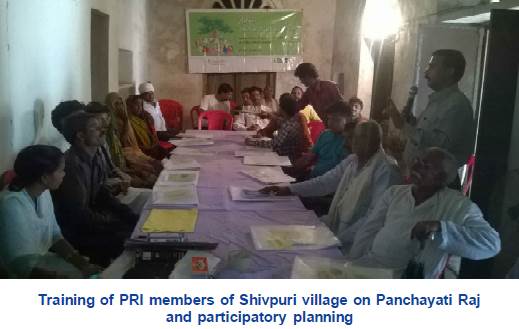|
Local Level Climate Adaptive Planning N owadays, climate change has become a major challenge for development efforts. Climate change adaptation is to anticipate the adverse effects of climate change, take corrective actions and prevent or minimise the damage that such changes can cause. As understanding has grown about the scale of the problems being faced by society as a result of climate change, it has become clear that building awareness and integrating climate change concerns in local planning and decision making processes on one hand and building synergy among different stakeholders on the other are critical so that informed decisions can be taken to effectively deal with climate change.It has been noticed that in a developing country like India, there is very low environmental awareness particularly among the rural masses which are most affected by climate change. This calls for a mass level environmental awareness, community ownership in processes and grass roots level adaptation planning and its integrations with block and district level plans. Local Level Climate Adaptive Planning It is well recognised that local government (Panchayat) is an important driver in the development of rural areas in India. This institution also acts as a single window for planning and implementation of all kinds of government programmes and policies. Thus, Panchayats can play an effective role in identifying adaptation measures as per local needs and developing environment sensitive plans which are supported with block and district level initiatives. Through participatory climate adaptive planning, Panchayats can address the problems of the most vulnerable sections of the society who are directly or indirectly affected by climate change. Climate Adaptive Planning in Madhya Pradesh Development Alternatives (DA) which has been working in rural Bundekhand – one of the most climate sensitive regions in Central India for the last 30 years, realised that Panchayati Raj Institutions (PRIs) in the area lack the capacity to prepare climate adaptive plans on their own on account of their lack of understanding of climate change and its effects. Considering the above challenge, DA’s team engaged with different stakeholders in the Datia district of Madhya Pradesh such as District Administration, PRI members, women, SHG members, watershed committees, farmers etc. Series of meetings and discussions happened with concerned government functionaries, PRI members and farmers separately. A core group of PRI members, SHG members, women and farmers were formed at the village level. Local issues related to climate change were identified with these groups. After the formation of core groups, series of capacity building exercises were organised. The overall objective of the village adaptive planning has been to enhance the capacities of the Panchayat and community members to adapt to climate change effects. Simultaneously, different schemes of the government which comprise a considerable amount of environmental components like MGNREGA, IWMP, IMP etc. were identified with consultation of the Panchayat and district administration representatives. A district level sensitisation workshop was also organised for block and district level officials for validation of departmental schemes and integration with district level plans. After the technical validation, the plan was shared with the Panchayat and core group committee for submission to the higher authority. Preservation of natural resources and their sustainable management and climate resilient agriculture practices are at the heart of DA’S approach of community based adaptive planning. Such kind of planning practices at the grassroots will help to redefine bottom up planning at the village level. It will successfully integrate climate change uncertainties in the village micro plans. Simultaneously, it will make rural masses aware about climate change and make them act to plan in advance to prevent the effects of climate change. Above all, the benefits of such innovative planning will be usable knowledge for local decision makers and stakeholders on how to prepare climate adaptive plans. q Chandan Kumar Mishra
|
